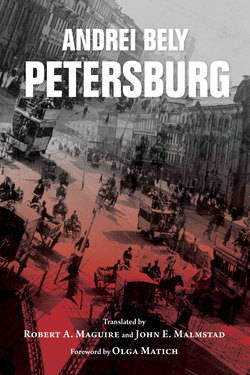Читать книгу Petersburg - Andrei Bely - Страница 33
На сайте Литреса книга снята с продажи.
APOLLON APOLLONOVICH RECALLED
ОглавлениеYes, Apollon Apollonovich recalled: recently he had overheard an inoffensive joke told by the clerks about himself:
“He harps on the same note: disdain. . . .”
His defenders intervened:
“Gentlemen, that comes from hemorrhoids. . . .”†
At that point the door flew open. Apollon Apollonovich entered.
The joke broke off (thus does a nimble baby mouse scamper off into a crack). Apollon Apollonovich did not take offense at jokes.
Apollon Apollonovich then went up to the window. Two heads in the windows across the way saw opposite them the blur of the face of an unknown little old man behind a pane.
***
Here, in the office of a high Government Institution, Apollon Apollonovich would grow into a kind of center of governmental institutions and green-topped tables. Here he was a point of radiating energy, a grid, an impulse. He was a force in the Newtonian sense, and a force in the Newtonian sense is an occult force.
Consciousness would detach itself from individuality, becoming incredibly clear and concentrating in a single point (between the eyes and the forehead). A flame, flaring between the eyes and the forehead, would scatter sheaves of lightning bolts. His lightning-bolt thoughts would fly from his bald head in every direction like snakes; a clairvoyant would doubtless have seen the head of the Gorgon-Medusa.
Consciousness would detach itself from individuality: and individuality presented itself to the senator’s imagination as a cranium and as a container that had been utterly emptied.
From this armchair he would intersect his life by means of his consciousness. From this place circulars sliced up the patchwork field of humdrum life, which he would equate with sexual, vegetable, or other kinds of needs.
Only from here did he loom and hover madly over Russia, and in his foes evoke a fateful comparison (with a bat).†
Apollon Apollonovich was particularly sharp today. Not once did his head nod over a report. Lord knows why, Apollon Apollonovich had come to the conclusion that his very own son, Nikolai Apollonovich, was a scoundrel.
***
At the entryway the caryatid was visible: a bearded man of stone.
The bearded man of stone rose above the noise of the street, above the seasons. The year eighteen hundred and twelve saw him freed from his scaffolding. The year eighteen hundred and twenty-five saw the crowds rage beneath him.† The crowd passed by even now, in the year nineteen hundred and five. For more than five years Apollon Apollonovich had been looking daily from here at the smile carved in stone. The tooth of time was gnawing it away. During those five years events had flown by: Anna Petrovna was in Spain; Vyacheslav Konstantinovich was no more; the yellow heel had brazenly mounted the ridges above Port Arthur; there had been turmoil in China, and Port Arthur had fallen.
The door opened. The secretary, a young man with a medal flapping on his chest, flew up to the high personage, the over-starched edge of his cuff crackling deferentially. And to his timid question Apollon Apollonovich droned back:
“No, no! Do as I said. And you’d better do it . . .” said Apollon Apollonovich; but he stopped and corrected himself:
“I mean . . .”
He had wanted to say “be so good as” to the secretary, but it came out “you’d better do it.”†
The tales of his absentmindedness were legion.
